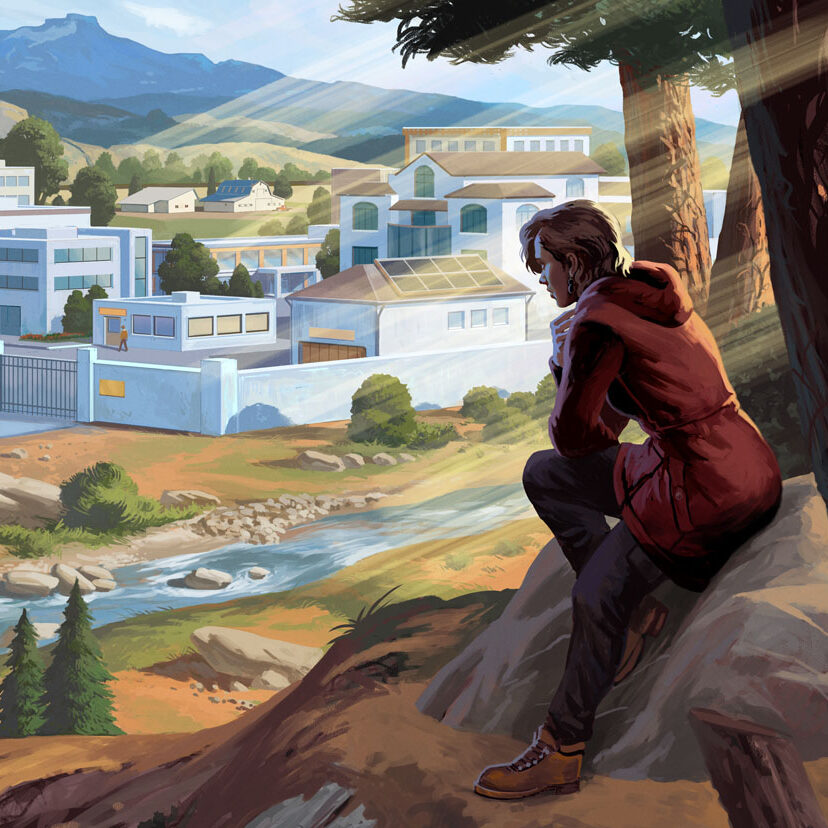[NOTE: THE NOVEL WILL BE PUBLISHED AT THE BEGINNING OF MAY. PLEASE SEND ME A NOTE AT [email protected] IF YOU’D LIKE A REMINDER WHEN IT IS AVAILABLE.]
Below is the Prologue of the new novel Surviving New America: Hope Thomas and Her Enemies. Check out the description, the Author’s Note, Chapter 1 and Chapter 2. Here’s a .PDF. Here is a little bit about me.
ISLE OF CALM, FLORIDA | MARCH 5, 2040
I’m a retiree living in Isle of Calm, a pleasant but dull gated community near Naples on the west coast of Florida. A couple of years ago, I decided to liven things up a bit by giving free English lessons in our pretty little community square. My students were mostly immigrant laborers and their families. I loved it. Doing something solely to help people gave me a sense of fulfillment that is impossible to get in any other way. Helping may be the only good addiction.
A bonus was getting to know Frank Dyson. Frank approached me at my little booth during one of a long string of bright and peaceful mornings. He asked if I was interested in helping him write the story of the part he played in the great drama that pitted Hope Thomas against New America back in 2029 and 2030. I certainly
was intrigued. Everyone followed that struggle. It was riveting, as we used to say, and big news for a long time.
Frank is amused easily and by many things, not the least of which is his minor celebrity. He lives in Sunny Shores, a development just south of Fort Myers. His name for it—“Sunny Snores”— is more fitting than the real one and signaled that we felt the same way about the beauty and boredom of retirement down here. I recognized that it was the beginning of a beautiful friendship, to borrow Humphrey Bogart’s great line from the end of Casablanca.
Frank was a lieutenant colonel in the National Guard and played a pivotal role in the most sensitive days of the conflict. The tale he told me was fascinating. I wanted to go further and pointed out that just detailing his involvement wouldn’t tell the whole story. After all, he only became important at the end. For most of the time, Frank was sitting in a big tent across a dirt road. He was a spectator, the same as the rest of us.
With Frank’s permission, I began calling the principals. He helped with phone numbers and email and text addresses telling folks it was okay to speak to me. Actually, he told them that I wasn’t particularly good-looking or bright, but harmless and okay to speak to if the individual was desperate for human interaction. I asked Frank about it later. He gave me his best deadpan and asked me to point out any inaccuracies.
A few people told me to get lost, usually in more colorful language than that. But almost everyone was willing to talk about it. Several spent hours speaking over the course of two or three conversations. They realized their connection to an important eventin American history and relished the opportunity to feel it all over again. Some had axes to grind. Others were perfunctory. They had moved on and simply wanted to get their side of the story into the record. Several were lonely. Those were the longest conversations. That was okay. I was in no hurry and, I guess, a bit lonely too.
Frank and I decided not to do a straight history. It had been done, and far better than we could. It was a deep, profound and uniquely American story and had been treated that way by social scientists and historians. Our goal was to humanize it. So we tried to “get into” the characters. There was a lot to work with besides the interviews. Law enforcement surveillance captured audio of much of what happened in New America. There even is some video. There also are transcripts from thirty or so civil and criminal trials.
In our retelling, Frank and I invented dialog and guessed the speakers’ inner feelings. I read what we came up with to the people involved. There were some minor corrections. But I’m proud they all signed off on our recreation. That’s true even for those who didn’t come off looking so great. One called the recreation “uncanny.”
Another said, “Well, I wish that wasn’t what I was thinking and what I said, but I guess it was. Could you find a way to make me look like a little less of an asshole?”
Lincoln supposedly said America could only fail from within. It turns out that it was more a paraphrase than a quote. Unfortunately, a lot of people tried to prove he was right a few years before the New America drama occurred. Luckily that drama had a happy ending.
So let’s get to it. Some people say the story began with Jayson Damond’s hubris and fear of growing old. That’s not inaccurate. But it’s fuzzy, subjective and lazy. Frank and I decided the best place to start is with an actual event. It was when Hope Thomas met with Dr. Ellen Hart on an October day in 2029…
